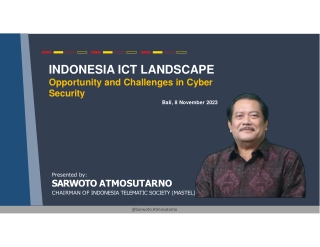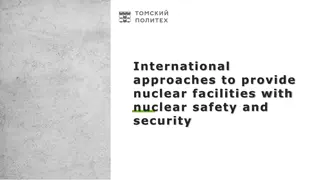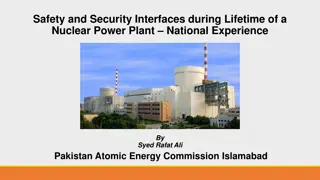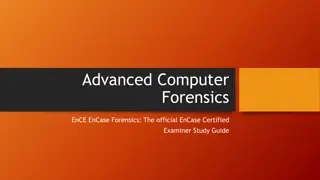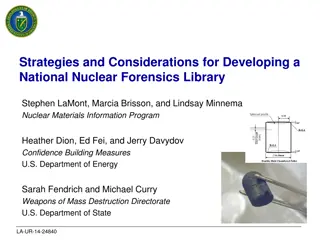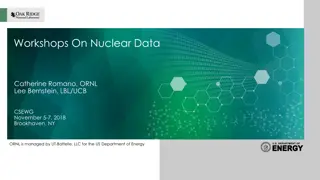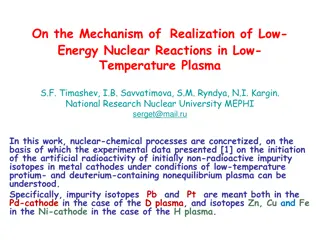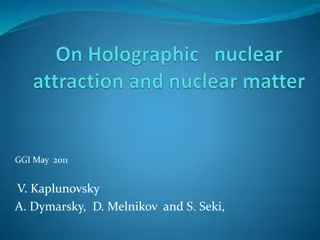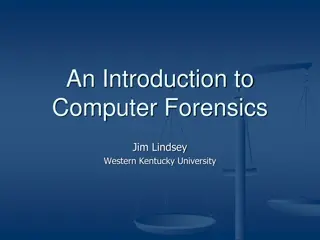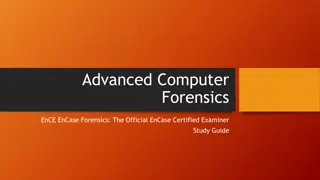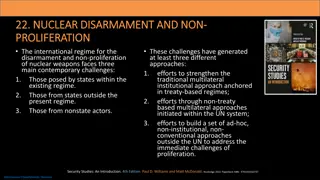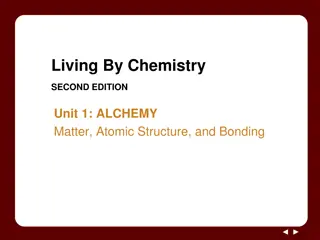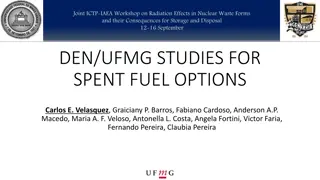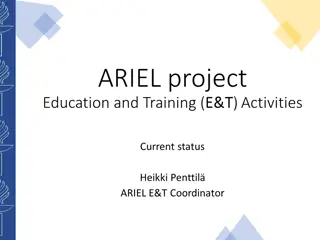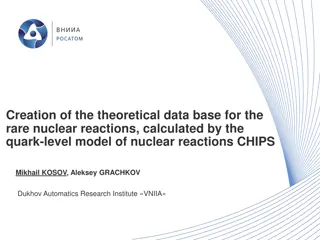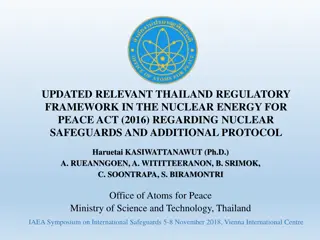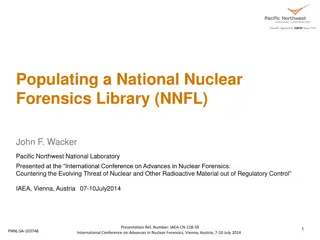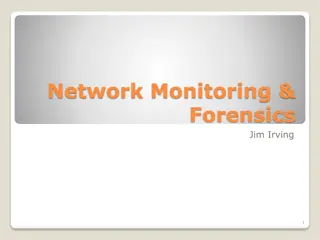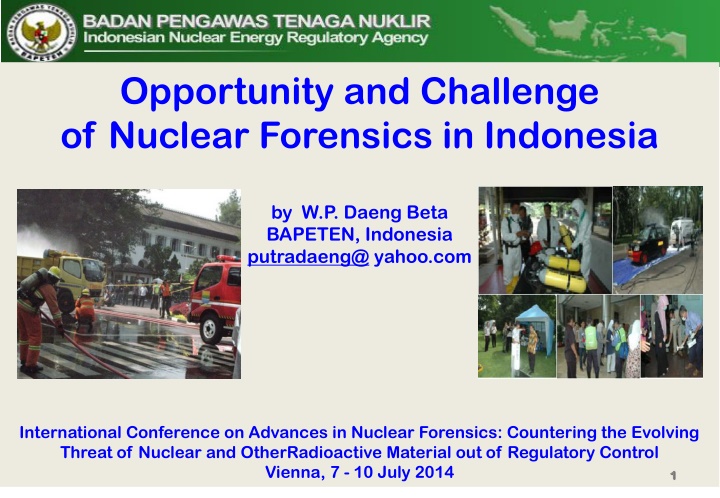
Nuclear Forensics in Indonesia: An Overview
Indonesia focuses on nuclear security and combating illicit trafficking, emphasizing the importance of nuclear forensics. This article discusses the opportunities and challenges in this field, including objectives, methods, and results.
Download Presentation

Please find below an Image/Link to download the presentation.
The content on the website is provided AS IS for your information and personal use only. It may not be sold, licensed, or shared on other websites without obtaining consent from the author. If you encounter any issues during the download, it is possible that the publisher has removed the file from their server.
You are allowed to download the files provided on this website for personal or commercial use, subject to the condition that they are used lawfully. All files are the property of their respective owners.
The content on the website is provided AS IS for your information and personal use only. It may not be sold, licensed, or shared on other websites without obtaining consent from the author.
E N D
Presentation Transcript
Opportunity and Challenge of Nuclear Forensics in Indonesia by W.P. Daeng Beta BAPETEN, Indonesia putradaeng@ yahoo.com International Conference on Advances in Nuclear Forensics: Countering the Evolving Threat of Nuclear and OtherRadioactive Material out of Regulatory Control Vienna, 7 - 10 July 2014 1 1 1 1
1. INTRODUCTION Indonesia concerned with the physical protection of nuclear material and nuclear installations, nuclear material accountancy, detection and response to illicit nuclear trafficking, the security and safety of radioactive sources, emergency response measures, including pre-emergency, and the promotion of adherence to relevant international instruments. It is important for Indonesia to prevent, detect and response to incidents involving the illicit trafficking of nuclear materials and other radioactive sources. Indonesia itself is the victim of several terrorist bombings, and certainly it is unthinkable if the terrorist have had the access to such dangerous materials, such as nuclear material. Currently, Indonesia operates 9 international airports and 20 international seaports. It is necessary for us to ensure that we can effectively reduce the risk of the smuggling of nuclear materials and radioactive sources in these international gateways. 2 2
1. INTRODUCTION More importantly, Indonesia is a part of the global community in combating nuclear terrorism. As our president mentioned during the Second Nuclear Security Summit in Seoul early 2012, Indonesia fully supports international cooperation to enhance peace and security in the world. Indonesia, in this case BAPETEN and other relevan institutions have the responsibility for combating illicit trafficking and the inadvertent movements of radioactive material. Nuclear forensics is one element of nuclear security regime that should be viewed as the opportunity and challenge for BAPETEN and Indonesia. 3 3
2. Objectives To overview the opportunity and challenge of nuclear forensics in Indonesia 3. Methods SWOT analysis and study of literatures. In SWOT analysis, we identify strenght, weaknesses, opprortunities, and threats. 4 4
4. Results and Discussions (1) 4.1. From Nuclear Security Plan 2010-2013 to Nuclear Security Plan 2014-2017 It has been mentioned in Nuclear Security Plan 2010-2013 that one of activities in contributing to the Enhancement of a Global Nuclear Security Framework Program is completing and considering options for further broadening the participation in ongoing and new CRPs aimed at developing improved, user- friendly and effective radiation detection instrument, for risk methodology development and for nuclear forensics. One of activities in Risk Reduction and Security Improvement Program is supporting the development of nuclear forensics capabilities and making such capacity available to all States. 5 5
4. Results and Discussions (2) 4.1. From Nuclear Security Plan 2010-2013 to Nuclear Security Plan 2014-2017 (con t) Development of nuclear forensics capabilities for Indonesia is a matter of concern. Author believes that capacity on nuclear forensics has to be enhanced in order to build a better nuclear security infrastructure. So, author hopes that these programs and activities could be sustainably continued in nuclear security plan 2014-2017. Indonesia will take part on these programs. Also Indonesia will organise activities under these programs. 6 6
4. Results and Discussions (3) 4.1. SWOT Analysis Weaknesses Strenght 1. Indonesia has an intention to apply nuclear forensics 1. Lack of capability on nuclear forensics. for responding nuclear security event and nuclear 2. Indonesia concerned with national nuclear security security threat. matters 2. Indonesia assumes Nuclear forensics is a powerful 3. Lack of quality human resources. tool. Opportunities Threats 1. Nuclear forensic science is closely related to the 1. Terrorists attacks/nuclear terrorism phenomenon of illicit trafficking, nuclear security and 2. Border crossing threats, illicit trafficking, orphan nuclear safeguards. A border crossing threat is calling sources and nuclear security at major public event. for an internationally coordinated response. 3. The exchange of information on nuclear materials as 2. to establish broad international cooperation appears well as on analytical methodologies is often restricted, highly recommendable in view of the threats of due to commercial sensitivities and for national nuclear terrorism, which is unavoidably linked to illicit security reasons. trafficking of nuclear material. 7 7
4. Results and Discussions (4) 4.2.1. Strenght (1) Indonesia has an intention to apply nuclear forensics for responding nuclear security event and nuclear security threat. Nuclear security event is an event that has potential or actual implications for nuclear security that must be addressed. Nuclear security threat means a person or group of persons with motivation,intention, and capability to commit criminal or intentional unauthorized acts involving or directed at nuclear material, other radioactive material, associated facilities or associated activities or other acts determined by the State to have an adverse impact on nuclear security. 8 8
4. Results and Discussions (5) 4.2.1. Strenght (2) Indonesia assumes nuclear forensics is a powerful tool to identify the origin of the seized nuclear material and provide feedback on potential security weaknesses. Nuclear forensics is the analysis of intercepted illicit nuclear or radioactive material and any associated material to provide evidence for nuclear attribution. The goal of nuclear analysis is to identify forensic indicators in interdicted nuclear and radiological samples or the surrounding environment, e.g. the container or transport vehicle. These indicators arise from known relationships between material characteristics and process history. 9 9
4. Results and Discussions (6) 4.2.1. Strenght ((2)con t) Thus, nuclear forensic analysis includes the characterization of the material and correlation with its production history. The purpose of the nuclear security regime is to prevent, detect and respond to nuclear security events (e.g. illicit trafficking of nuclear material or a nuclear terrorism attack). Nuclear forensic analysis is a key technical capability that utilises signatures inherent to nuclear or other radioactive material to provide information on its source, production and history. It can be used as part of the response to the nuclear security event, as well as to help prevent it. 10 10
4. Results and Discussions (7) 4.2.2. Weaknesses (1) Indonesia does not have their own nuclear forensic capabilities. (2) Indonesia concerned with physical protection of nuclear material and nuclear installations, nuclear material accountancy, detection and response to illicit nuclear trafficking, the security and safety of radioactive sources, emergency response measures, including pre-emergency, and the promotion of adherence to relevant international instruments. These concerns can be weaknesses. (3) Lack of quality human resources and sustainability of knowledge management in nuclear forensics. 11 11
4. Results and Discussions (8) 4.2.3. Opportunity of Nuclear Forensics (1) Opportunity of Nuclear Forensics are discipline between science, law enforcement; uses systematic approach for analysis and attribution; benefits from reference data; provides clues on the origin of the material; assures sustainability in combating illicit trafficking; calls for International cooperation; and methodology applicable in other areas. (2) Nuclear forensics and the analysis of foreign nuclear test rest on the same scientific base. Nuclear forensics for attribution involves comparing data and analysis samples from identified sources. Forensics analysis for attribution therefore requires that data concerning foreign origin material be available. Therefore, nuclear forensics analysis would benefit from as much international cooperation as possible. 12 12
4. Results and Discussions (9) 4.2.4. Threats on nuclear security - Challenge of Nuclear Forensics (1) The risks of the smuggling/illicit trafficking of nuclear materials and radioactive sources in international gateways, border crossing, nuclear terrorism, orphan sources and nuclear security at major public event have been emerged. These threats pose serious challenges for governmental organizations, users of nuclear technology and society in all regions of the world. Although most States have recently adopted enhanced measures to address threats, further sustained efforts will be necessary to meet this threat in the future. 13 13
4. Results and Discussions (10) 4.2.4. Threats on nuclear security - Challenge of Nuclear Forensics (2) (1) the methods safeguards inspectors use to verify compliance with treaty obligations is "environmental sampling", i.e. the collection of particles within (or outside) nuclear facilities using swipe sampling. (2) The need for laboratory analysis facilities and new technology; including field equipment and numerical modelling, software of code. (3) The need for quality of human resources with relevan capabilities and competencies. 14 14
4. Results and Discussions (11) 4.2.4.Threats on nuclear security - Challenge of Nuclear Forensics (3) (4) Nuclear forensics remains a technically complex challenge for the scientific and law enforcement communities. The difficulty in kin succesful forensics work, especially an attribution process, should not be underestimated. (5) Knowledge management: the future problem of declining pool of technically competent scientists. The underlying scientific disciplines, radiochemistry, nuclear physics, and others are understood adequately for the purpose of forensics. 15 15
4. Results and Discussions (12) 4.2.4.Threats on nuclear security - Challenge of Nuclear Forensics (4) (6) Indonesia has National Legislation Implementation Kit for Nuclear Security to deal with the threat of nuclear and other radioactive material out of regulatory control, namely illicit trafficking, orphan sources and major public event. It was mentioned in the kit that nuclear forensics is an important part of nuclear security regime. In Nuclear Security Summit 2014 (Den Haagh, 24-25 March 2014) Indonesia delegates stated that Since 2013 the Government has started the process of drawing up a draft law on nuclear security with the view to submit it to the parliament in 2015. 16 16
4. Results and Discussions (13) 4.2.4.Threats on nuclear security - Challenge of Nuclear Forensics (5) The Government of Indonesia sees the importance to strengthen its national legislation which in turn can reinforce and complement existing law such as the Law No. 10 Year 1997 on Nuclear Energy. The law is expected to cover, inter alia, total prohibition of the use, possession and transfer of nuclear weapons; strengthening transfer control and licensing for the possession and transfer nuclear and radioactive materials, and enhancing national nuclear security architecture . 17 17
4. Results and Discussions (14) 4.2.4.Threats on nuclear security - Challenge of Nuclear Forensics (6) Indonesia has submitted the National Legislation Implementation Kit as house gift in the 2014 Nuclear Security Summit with the objective to help States with building blocks to develop comprehensive national legislation in accordance with their own respective legal cultures and internal legal processes. (7) Experience on inspection and law enforcement are the ways of controlling and enforcing nuclear security implementation in Indonesia as parts of nuclear security infrastructure has to be manage at the best and maintained their qualities. 18 18
5. CONCLUSION Nuclear forensics to be one of nuclear security infrastructure that has to be planned and strengthened in order to respond to nuclear security events in Indonesia. Also, to develop international cooperation in the area of nuclear forensics through IAEA and relevan institutions is an important matter for Indonesia. 19 19
THANK YOU FOR YOUR ATTENTION 20 20


